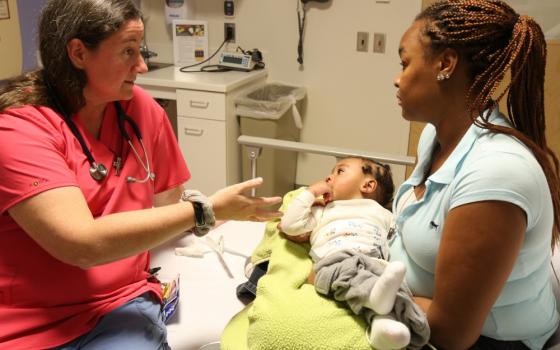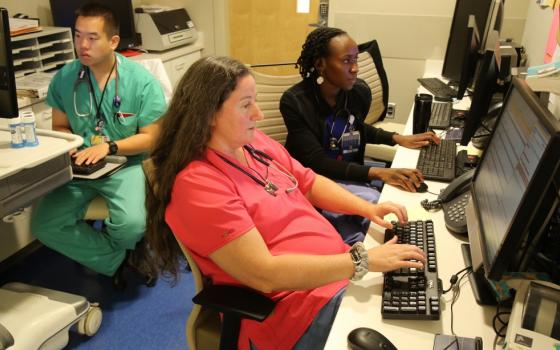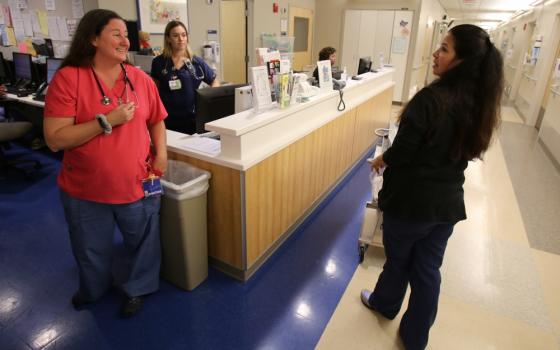At Johns Hopkins University Children's Center, Mercy Sr. Karen Schneider – a physician and an assistant professor of pediatric emergency medicine – is occasionally asked if she is a nun.
That may be because of the silver cross she wears over her scrubs or because word has gotten around that "there's a sister at Hopkins."
If she tells patients she is a Sister of Mercy, they give her a blank look. "They think it's a band group," she said. If she clarifies to say, "I'm a Roman Catholic sister," the blank looks remain.
But when she says she's a nun – which she points out is not technically correct, since she doesn't live in a cloistered or semi-cloistered setting – people understand, but they are still baffled.
But for Schneider, being both a doctor and a woman religious makes perfect sense.
"It all comes together," she said, noting that she is a "pediatrician – which is my work, my ministry which I love" and also is a Sister of Mercy, she told Catholic News Service in October in her office in a wing adjacent to the constant flow of patients, doctors and nurses in the busy emergency room.
Schneider's office walls and bookshelves display certificates, photos of family members and children she's cared for from Samburu tribes in Kenya. The wall that you don't see until you are completely in the office she calls her "Sister of Mercy wall." It has a simple cross over the door, a list of spiritual and corporal works of mercy and quotes of Mother Catherine McAuley, founder of the Sisters of Mercy.
Behind her desk, a small refrigerator is filled with lime Diet Cokes and some leftovers. Floor space is stacked with piles of towels, baby formula and supplies for a medical trip she was planning to Kenya.
For the past several years, she has taken teams of medical students on four trips a year to Guyana, Haiti, Kenya or Nigeria as part of a Johns Hopkins University course she teaches called Pediatric Tropical Medicine.
These trips began when Schneider was a medical student and volunteered in Guyana in the midst of a malaria epidemic. She has since worked in Haiti immediately after an earthquake and also after a hurricane.
She said bringing free medical care to people who have had little or no contact with doctors has been "profound and life changing."
On a practical level, the trips give medical students an experience "of what medicine is like outside of Hopkins" on dirt roads, without electricity, running water, CT scans or X-ray machines.
"Plus, we're a workforce, taking care of hundreds of patients a day."
When she's not traveling, the 51-year-old sister who lives in Silver Spring says morning prayers with the sister she lives with when their schedules allow.
"I get up and go to work and she goes to work," she said, pointing out that it is different that she works at a hospital and not a school or church, seen a more traditional roles for women religious. But she also notes that she's been at the hospital 15 years and her colleagues are used to her.
"It's just kind of like, oh that's just Karen; she's our nun," she said.
She said Sisters of Mercy "take a fourth vow to serve poor, sick and ignorant, and we can basically do any ministry that will fulfill that fourth vow."
"I can't think of anything better to do that than to be a physician, helping the poor and being with the sick," she said, adding that she also does a fair amount of teaching not just with medical students but also giving parents and caretakers advice.
Schneider was born and raised in Long Island, N.Y., and that distinct accent still comes through when she is sitting on hospital beds talking to patients.
She attributes her medical passion to her mother, an emergency room nurse who came home with incredible stories and who also ended up taking care of neighbors who asked for Nurse Marion: a man who cut his hand with a saw, a baby with a fever, a child after a bike crash, a woman who went into early labor and the boy across the street with diabetes.
Schneider came to her vocational calling after joining a parish youth group as a high school junior – praying with them and doing good works together.
When she told people she thought it seemed like a great idea to live in community and pray with people and do good works with them, everyone assumed she wanted to be a woman religious.
Her response was: "No way, I'm too normal."
But then she began volunteering at a soup kitchen run by Sisters of Mercy and admired what they were doing.
"Maybe I do want to be a nun!" she said, surprising herself before she "tried it out for one year and then another," and now she's been a sister 31 years.
Initially, she thought she'd have to give up her dream of becoming a doctor to be a sister, but after meeting a group of sister doctors and realizing she could do both, she applied for medical school after making her final profession of vows.
Her work now, caring for sick children in Baltimore and remote villages, has made her realize that parents everywhere have the same worries.
"It's just more profound and dramatic when you're under a mango tree somewhere around the world," she said. "They all want their children to live."



